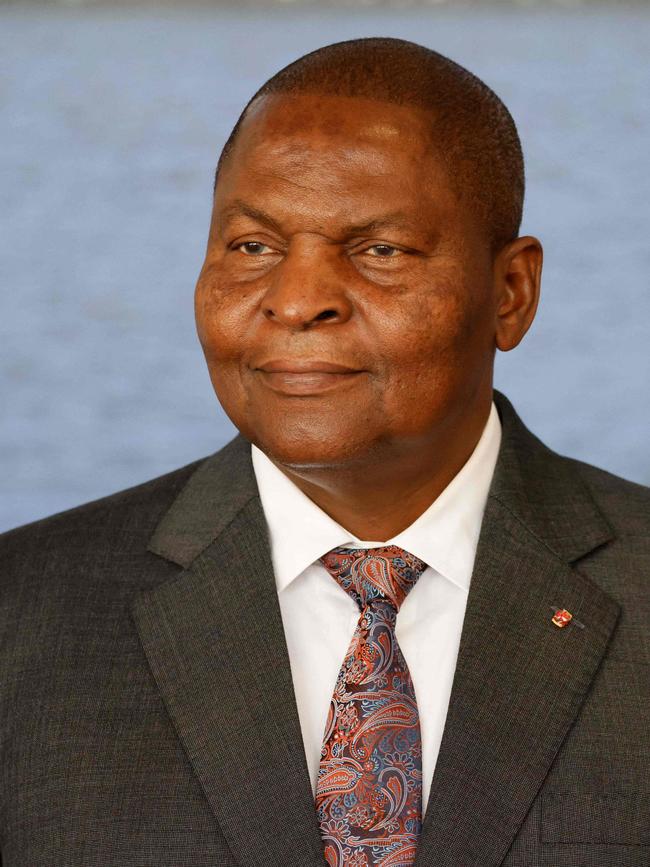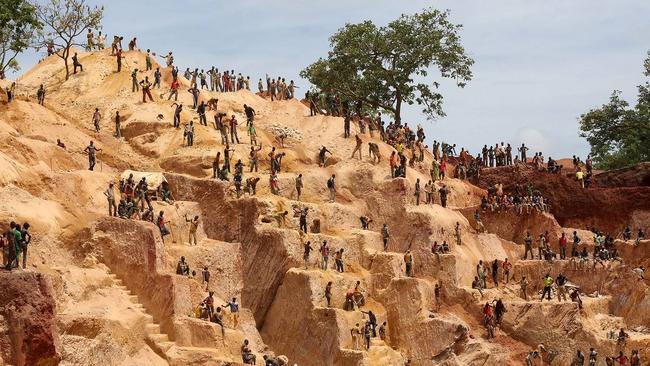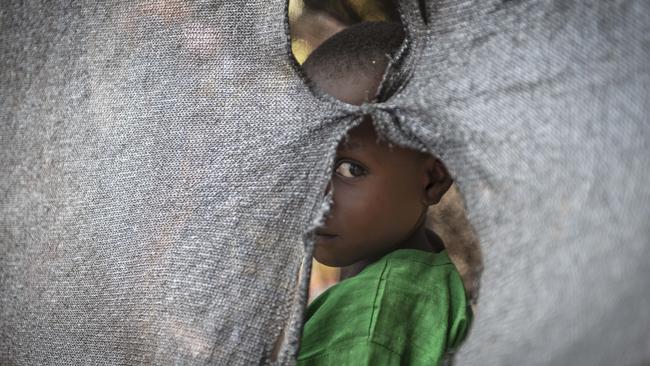Russia’s Wagner Group turns Central African Republic into zombie nation
Wagner’s takeover of the Central African Republic has been so effective that the country is barely capable of making its own decisions without consulting Russian mercenary chiefs.
As the exorcism progressed to the swing of the thurible, swirling incense and tumbled words of prayer, a sheen of sweat gathered on the priest’s face.
Monsignor Serguei Voyemawa crossed himself and placed his hands on the head of the young girl who sat bowed on a wooden stool at his feet, with flickering candles on each side. He had been summoned to drive out the evil spirits within her.
“Her parents told me that the girl was possessed, strangely sick and visited by phantoms in the night,” he said. It was the ninth of 12 similar sessions the child had undergone in the St Andre’s Russian Orthodox Church in Bangui, capital of the Central African Republic (CAR).
As the last prayers ended, the child stood up, joining her parents and the priest to sing a hymn. They sang in French. The church was empty but for the icons, newly painted thanks to money from Moscow, staring down from frescoes on the walls.
I looked at the girl as she sang, wondering what had caused the suggestion of a devil inside. She stared back calmly and smiled, perhaps seven years old, red ribbons in her braids.
There was little unusual in the exorcism itself. They are no rarity in the CAR, one of the poorest nations on Earth, where a 63 per cent illiteracy rate, a culture of deep traditional superstition, and constant cycles of war across two decades have entrenched a fear of all that may be unholy in the minds of the populace: a land chosen by Russia’s Wagner Group for its most significant intervention on the continent.
More surprising was the priest’s recent decision to swap his spiritual fealty to the patriarchate of Moscow and adopt a Russian name. After three months spent studying theology in Russia last year, and a further six weeks this year, Voyemawa is the first priest in the country representing the Russian Orthodox Church.
Moscow has poured money, mercenaries and munitions into CAR and support for Russia is particularly strong in the capital Bangui.
Moscow has also paid for the restoration of his church and the renovation of the orphanage the priest runs beside it, where 67 war orphans aged between three and 13 receive basic Russian lessons as part of their syllabus.
Voyemawa’s conversion and the renovations to his church are part of much more than traditional Russian theological outreach. In the five years since President Faustin-Archange Touadera signed a bilateral military co-operation agreement with Moscow and received guns and mercenaries in return to back up his crumbling FACA army, the impoverished country has been penetrated at every level – cultural, military, political, economic – by a combined Russian military and influence operation led by the Wagner Group.

Using an upgraded version of counter-insurgency doctrine involving timber, blood, hearts and mines, and about 1800 Wagner fighters, the model has been so effective in its takeover of the CAR that the country has become a zombie host barely capable of making its own decisions without consulting Russian mercenary chiefs.
A Russian veteran of the French Foreign Legion’s parachute regiment who is nicknamed “The President” by diplomats advises Touadera on security and runs the Wagner operation. Russian advisers are present in every leading CAR ministry. A radio station, Radio Lengo Songo, paid for by a Wagner-affiliated company, pumps out pro-Russian, anti-French messaging.
Local journalists are leant on to publish pro-Russian stories, or paid to do so with the promise of visits to Moscow. Russian-made vodka, Wa Na Wa, sold in sachets, has become a leading liquor brand. Gold, timber and diamond concessions are granted to Wagner-affiliated companies in return for men and munitions.
There is even a Russian move to push out the French brewer Castel, one of the last remaining large French businesses, and dominate the local market with a new brand of beer, Africa Ti L’Or. It is brewed in Bangui, but by a company owned by Russia’s cultural attache in the country, Dmitry Sytyi, sanctioned by the EU this year for his alleged Wagner links.
Pressure on Castel intensified last year when local social media platforms began claiming that it was funding rebel groups.
On March 7 Castel’s premises in Bangui, already subjected to mysterious drone overflights, were petrol-bombed. The blaze was limited, but video from the brewery’s security cameras showed the assailants to be five unarmed white men, masked and wearing civilian clothes. Castel officials say they are certain the arsonists were Wagner men.
A lingering antipathy towards France, which withdrew the last of its troops from its former colony in December, provides the springboard for the Russians’ success, with a Soviet-era anti-imperialist stand in Africa still a factor.
“The Russians aren’t strangers here,” Voyemawa said. “They have been here for a long time. They never colonised Africa as the French did. They came to support Africans. It was the French who committed mistakes. But now the French speak of the Russians here as if they wanted to steal part of France.”
The priest is not alone in his sentiments. Contrary to Western perspectives of the Wagner Group, many of the CAR’s elite, sick of a stream of impotent UN peacekeeping missions, suspicious of colonialist powers and angry at France’s inability to halt the cycles of violence, have welcomed the Russian mercenaries’ intervention.
“Every week the Russians come here, or leave on rotation. Their name and origin are not our problem. Wagner, Beethoven, Mozart: it is all the same to us,” said Fidele Gouandjika, a chief adviser to Touadera. One of the richest men in the CAR, and fond of his “Billionaire of Boy-Rabe” nickname – tagged after the neighbourhood of Bangui where he was brought up – Gouandjika was effusive in describing the Russians’ preparedness to socialise, and to fight and die in defence of his President.
“The French treated us like dogs,” he continued, “but the Russians eat our food with us, they act like us, they go to our bars, our football matches, the cinema. And they fight and sometimes they are killed. Many are killed. They work very well and the people love them. We want to spread their message through the whole continent, so that the same model can help Africans elsewhere.”
The Russian ambassador in Bangui, Alexander Bikantov, said in February that 1890 “Russian instructors” were operating in the CAR, and confirmed that more had been requested. The Wagner force, headquartered in the crumbling palace that once belonged to self-styled emperor Jean-Bedel Bokassa, 80km north of Bangui, has helicopter gunships and L-39 Albatross light attack jets at its disposal. An undisclosed number of Russians have been killed fighting the rebels, but the mercenaries’ profits here could be huge.
The Ndassima mine complex north of Bambari, the largest-known gold deposit in the CAR, is already protected by Wagner and under Russian control. A leaked US diplomatic cable recently cited a possible $US1bn ($1.5bn) profit from the mine, if exploited to its full potential.

The Russians have also proved savvy in dividing the rebel groups opposing Touadera, sometimes by negotiation, sometimes by bullet. In January 2019, only months after the arrival of the first 175 Wagner trainers, the Russians brokered a peace accord between the government and 14 rebel groups, greatly reducing the scope of armed resistance.
Known as the Khartoum accord, it is still the CAR’s most likely road map to peace, though a year after it was signed six of the signatories formed a loose alliance of armed opposition groups known as the Coalition of Patriots for Change and marched on Bangui. The Russians repelled them and went on to recapture swaths of territory for the government.
Gouandjika, who sometimes wears a “Je Suis Wagner” T-shirt, boasted that in just 12 months Wagner fighters had extended the government’s control from 10 per cent of the country to 90 per cent. Those figures are exaggerated, but the trend is true.
By contrast, none of the previous missions in the country by French and African Union troops, nor the current deployment of more than 14,000 UN troops there, won back the territory the government desired.
“The Russians are the only force really willing to fight,” a Western observer in the CAR, speaking on condition of anonymity, said. “The African Union achieved nothing here. The French tried, killed a ton of people, then started losing soldiers and finally pulled out. The UN is the UN: passive. Credit Wagner where credit is due: they fight.”
Though Wagner was successful in breaking the rebel threat to Bangui, outside the capital the country is in disarray and its economy in rags. Of a population of 5.5 million the number of internally displaced people has risen to a record 722,000. Another 733,000 live abroad as refugees. The UN office for the co-ordination of humanitarian affairs estimates that more than 60 per cent of the population needs urgent relief.

Many allegations of human rights abuses have accompanied the Wagner Group’s counter-insurgency campaign, eroding the population’s consent to the Russian presence. Credible reports by Human Rights Watch and the UN have cited the presence of Russian-speaking fighters in incidents of murder and torture.
Malik Karomschi, 46, a lawyer and human rights activist, said he had gathered 377 testimonies of women raped or sexually assaulted by Russian personnel since the beginning of 2021. The most recent, taken five days before our meeting near a UN base in Bangui, where he arrived masked on a motorbike with a baseball cap pulled low over his eyes, involved a young woman arrested by a patrol in the city of Bambari and then gang-raped by six foreign soldiers.
“They were white, bearded soldiers. Russians. She was 24 years old,” Karomschi said.
He showed me a picture on his phone of a 13-year-old girl who was raped by two white foreign soldiers the previous year, he said. Over the following days he sent other pictures too, while constantly moving locations to avoid arrest.
The photographs included one of a man with his hands cut off, another of a group of bound prisoners lying in the dust. Some showed bodies with their heads cleaved by machetes, or burnt corpses with tongues protruding.
Of dates, locations, names, or details of who saw what done by whom to who, there was almost nothing, although one group of mutilated corpses was captioned as having been killed by Russians in the prefecture of Haute-Kotto.
Beyond Bangui’s city limits savage abuses were clearly happening, but too often the verifying details were blurred out by fear, the press of deep jungle and the sparsely populated reaches of distant savanna.
“It’s a problem we all face here in trying to document abuses,” a Western diplomat said. “We see the pictures too. But when? Where? Who?”
In Bangui itself, where the cycles of coup, counter-coup and savage rebel rampage have been broken by the Russian presence, many people claimed not to care much about reports of atrocity far to the north.
“We are proud of Wagner and the Russians,” said Ngombe Nakele Nibani, 32, a history student at Bangui University, where a memorial to Russian fighters, weapons raised in protection of an African woman and child, stands by the campus perimeter.
“Sure, we hear reports of rape and killings far away from here. We don’t know if they are true or not. But we do know that here in the city Russian fighters have brought us stability and the chance to study without fear.”
The Times



To join the conversation, please log in. Don't have an account? Register
Join the conversation, you are commenting as Logout